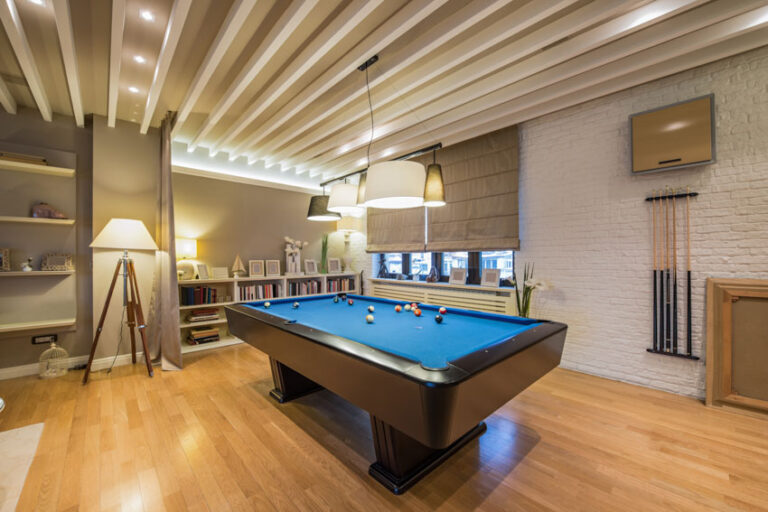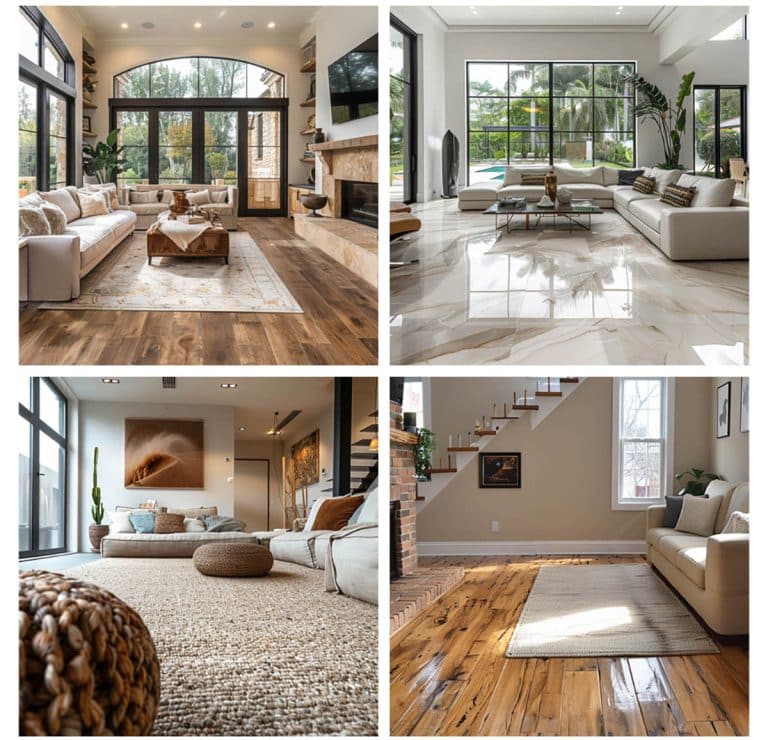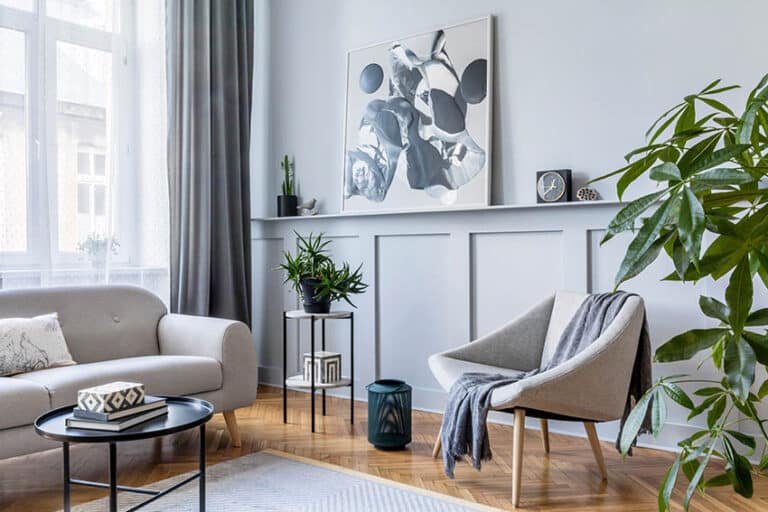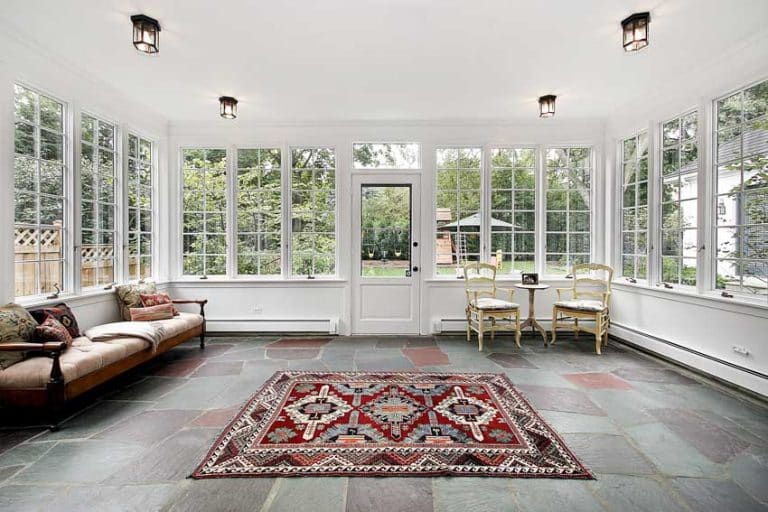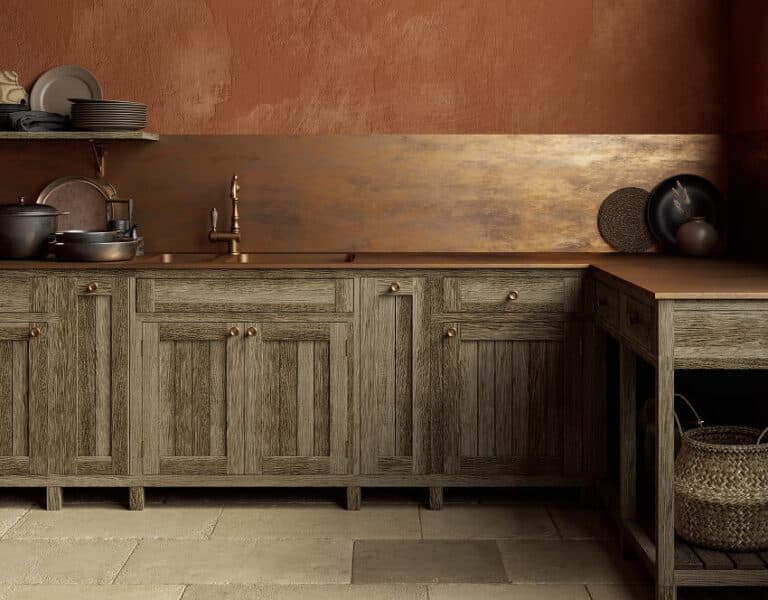What’s The Best Small Dining Room Lighting Tips For Function & Style?
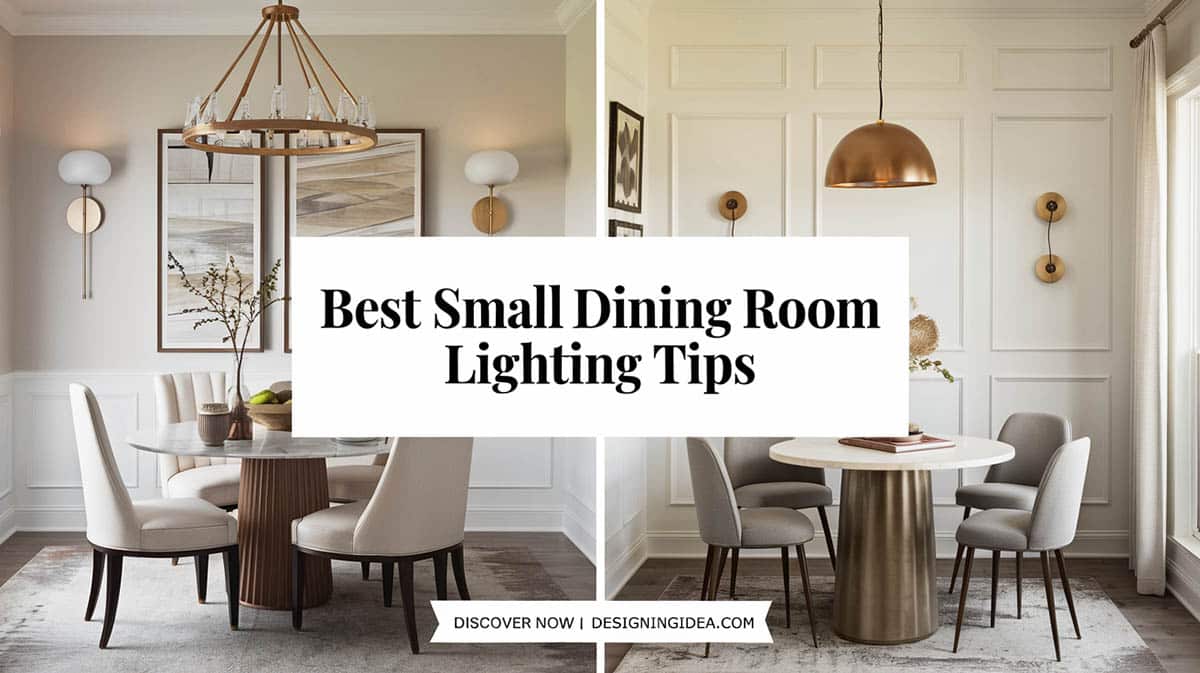
Lighting gives a big impact in terms of interior design and along with its proper use, can totally transform the overall perception of a room. Not only can the illumination change the atmosphere, ambiance and mood in a space, but it can also affect the way we perceive their size. Here’s your comprehensive guide to maximizing your small dining room’s potential through intelligent lighting choices.
Core Lighting Strategies For Small Dining Rooms
There are actually several techniques which one can employ to make small dining rooms feel larger than their actual size through creative lighting options. Here’s how to get started.
Multi-Directional Lighting
The first key tip to making small dining rooms appear visually larger is to vary the amount and the direction of the lights. Create depth and dimension by incorporating light from multiple sources and directions. This layered approach prevents shadows that can make spaces feel confined while adding visual interest to your room.
Upward Illumination
Direct light towards walls and ceilings rather than the floor, in that way you can create an illusion of a more expansive space. Directing the light towards the ceiling provides an illusion of a bigger space. Well-lit ceilings also seem higher and visually add more room to small dining spaces. You can either use track lights and layer them with directional wall lamps or use up light pendants since they can make spaces feel larger.
Design Tips:
- Direct light toward the ceiling to create an illusion of height
- Use wall sconces or track lighting with adjustable heads
- Consider up-light pendants for a modern touch
- Avoid dark spots near the ceiling that can make the room feel compressed
Wall-Washing Techniques
Wall-washing is the process of using light fixtures to create an even distribution of light across the walls.
Design Tips:
- Install bright wall lights to illuminate vertical surfaces
- Pair with light-colored, glossy walls for maximum light reflection
- Position lights 24-30 inches from walls for optimal spread
- Create an even wash of light to expand visual boundaries
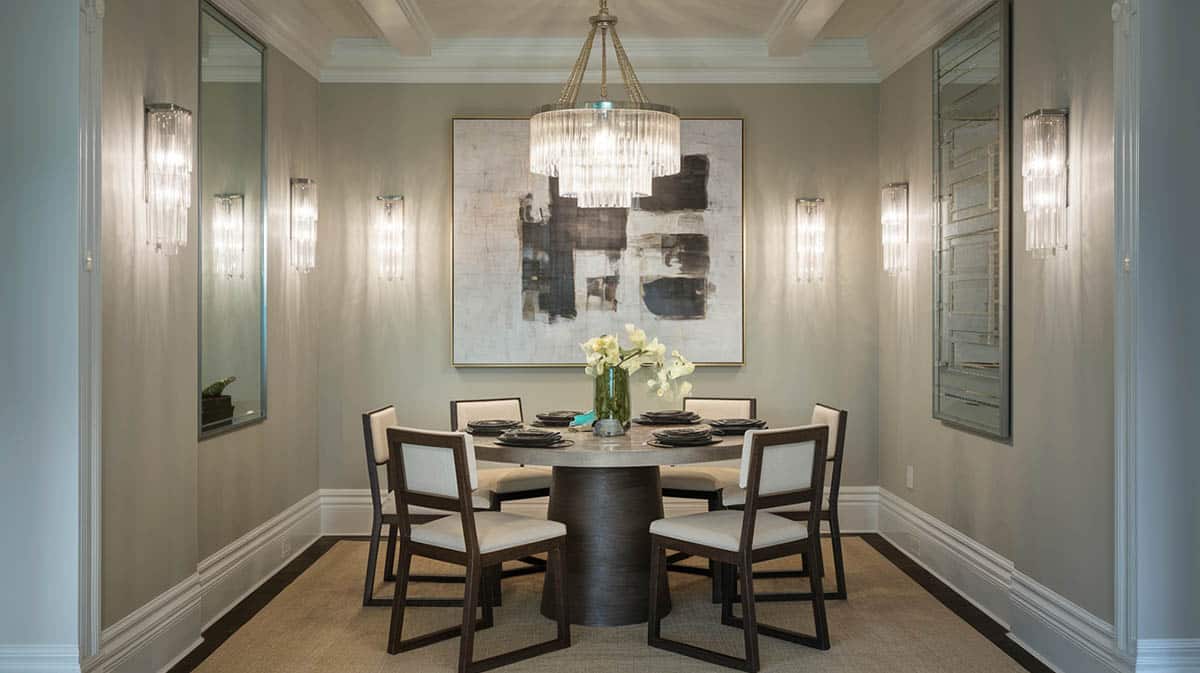
Smart Fixture Selection
The fixtures you choose will also play an important part in helping to enlarge the space.
Choose Reflective Materials
Choose lighting fixtures which are made up of shiny materials. Lighting fixtures which are made up of glass, shiny metal or plastic as they also reflect light from any surfaces and can help visually increase the size of a small dining room.
Design Tips:
- Opt for fixtures with glass, polished metal, or acrylic elements
- Select finishes that bounce light throughout the space
- Consider mirrored or metallic accent pieces to amplify light
Scale Appropriately
If dealing with a small dining room with low ceiling, it is more advisable to use recessed lights or flush ceiling-mounted lights as they do not take up much of your room’s vertical space. Hanging lighting fixtures, pendants or chandeliers are less advisable for dining rooms with low ceilings because aside from making a space appear smaller, they also present the risk of bumping into heads.
Design Tips:
- Avoid hanging chandeliers that are oversized and overwhelm the space
- Select compact track lighting with minimal profiles
- For low ceilings, choose flush-mount or recessed fixtures
- Maintain proportion between fixture size and room dimensions
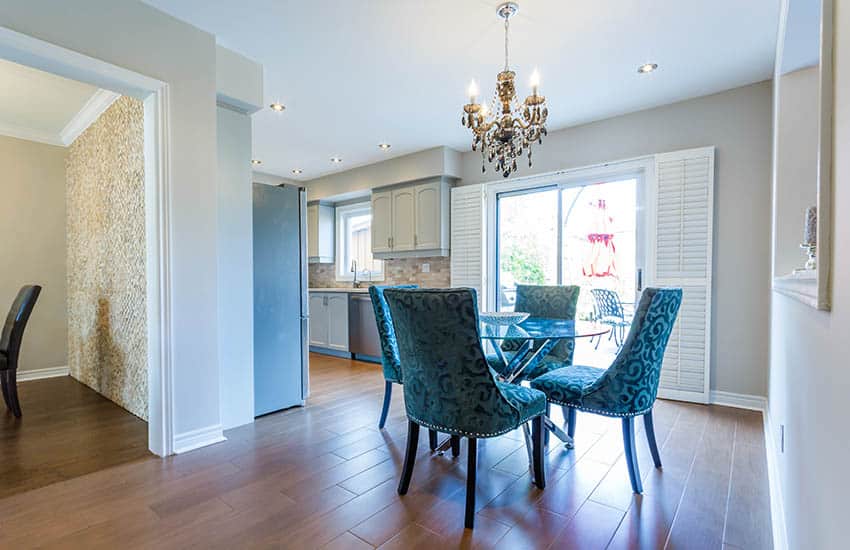
Color and Temperature Choices
Having the correct color temperature and bulbs is important to keeping the mood right. Here are some specific tips for creating an inviting ambiance.
Light Color Selection
Warm white lights can instantly make a space feel cozy and warm, but if you want to produce an illusion of a bigger space, it is best to stick with cool white light for your general luminaries. Cool white lights can also make a space feel more airy and provide a cleaner look, especially when combined with a light color palette.
Design Tips:
- Install cool white lights (4000-5000K) for general illumination
- Use cool tones to create an airy, open atmosphere
- Reserve warm white lights for accent lighting or specific mood settings
- Use a lighting tool to help determine your needs
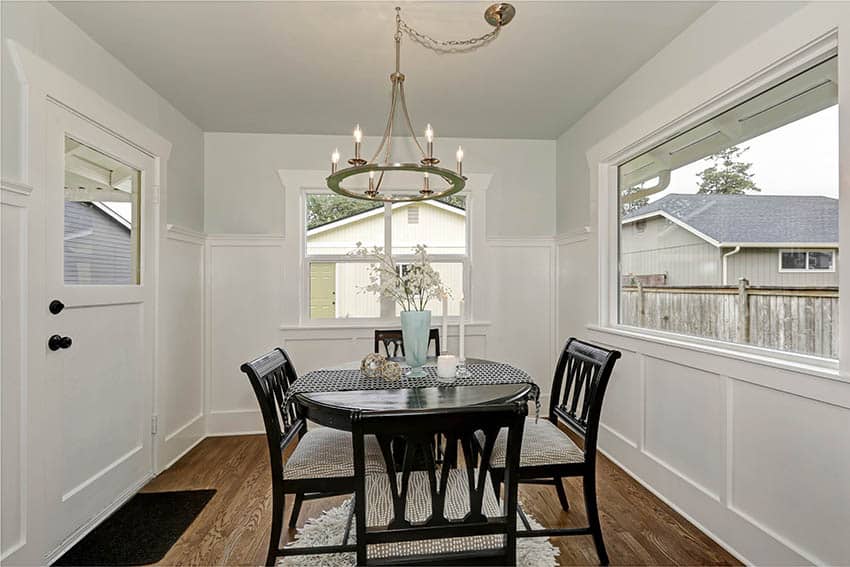
Ceiling Treatment
Color and luminaries go hand in hand, so if you want to make the most of your design, make sure to combine both to produce a visually appealing aesthetic and practical benefits for your home. White ceilings, in themselves, can already make spaces feel instantly larger, more airy, and spacious, and combining them with proper illumination can optimize this effect.
Design Tips:
- Paint ceilings bright white to maximize light reflection
- Consider semi-gloss finish for enhanced light bounce
- Ensure even illumination across the ceiling surface
Pro Tips for Success
Avoid using oversized chandeliers, pendant lights, or long track luminaries, as they can make small dining rooms feel cramped and limited. For track luminaries, opt for lighting fixtures with fewer bulbs. However, keep in mind that using smaller models can make your dining room appear shorter.
Layer Your Lighting
- Combine ambient, task, and accent lighting
- Create visual interest through varied light levels
- Use dimmers to adjust the atmosphere as needed
Avoid Common Mistakes
- Skip hanging fixtures in rooms with low ceilings
- Don’t rely on single-source lighting
- Prevent harsh shadows that can make spaces feel smaller
-
Consider Functionality
- Ensure adequate task lighting over the dining surface
- Install dimmers for flexibility
- Position switches logically for easy access
By implementing these lighting strategies thoughtfully, you can create a dining space that feels open, welcoming, and perfectly proportioned, regardless of its actual dimensions.

